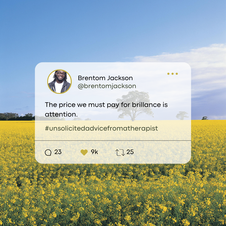In a world of increasing distractions, attention is a scarce commodity. We are bombarded with tweets, pings, and telephone rings. How do we quiet the noise, pay attention, and write brilliantly? The ancient practice of mindfulness, with a few modern innovations, might be the key.
USE DISTRACTIONS TO YOUR ADVANTAGE
In my work as a psychotherapist, I recommend two things to every client. Practice journaling and develop personalized mindfulness practices. Before you book your ticket to meditate in the Himalayas, I must point out that meditation is only ONE type of mindfulness practice. Here is an alternative that is a bit more user-friendly:
- Identify a habit that distracts you during writing. (e.g., doom-scrolling social media)
- When you find yourself engaging in that habit, pause.
- Turn your attention to the judgmental voice in your head. (e.g., “You should be writing!” “You’re such a procrastinator!” “You’ll never accomplish anything at this rate!”)
- Now, turn your attention away from that voice and toward the present moment by asking yourself a few questions.
- What post did I pause on? (e.g., funny cat video)
- What sensations do I notice in my body? (e.g., tension in my jaw, rumbling in my belly)
- What things do I notice in the background? (e.g., the curtains in the background are ripped to shreds)
Finally, turn your attention toward your task by asking yourself more questions.
- What would my protagonist/antagonist notice about this?
- What sensations would my protagonist/antagonist notice in their body?
- What next step should I take to return my attention to writing? (e.g. Log Out!)
This method helps you accomplish a few things:
It helps you disengage your judgmental voice. Making it more likely you will eventually break the habit. If judgmental thoughts are not dealt with effectively, they can wreak havoc. You may engage in the habit more to cope with the negative emotions they create.
You learn to refocus. Often, people think of mindfulness and meditation as a static state of fixed attention. However, the intention is to teach your body/mind to refocus on your objective (observing the breath, sensations, or repeating a mantra). The more you practice refocusing, the faster this process occurs in everyday life, and it will start to appear as if you never lose focus. When actually you’ve just developed lightning-fast refocusing super-powers.
Gently and slowly, bringing your attention back to your characters by imagining how they may react in this present moment will possibly spark some ideas and reignite the drive to continue writing. Who knows? You might even go on to use some of the sensory information you’ve gathered in your story.
Now that you’ve overcome your scrolling habit, you may have time to spare. Use it to check out “The Mindful Writer” by Dinty Moore for more great tips on how to reclaim your attention and release your brilliance.




